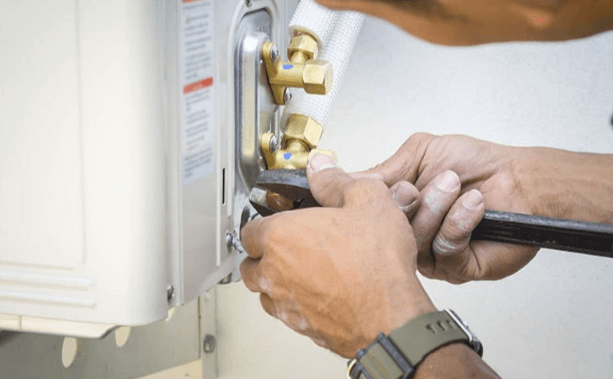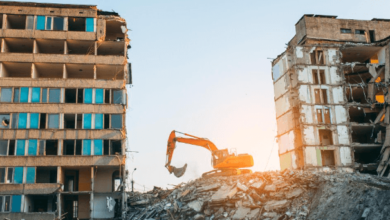How to Maintain Your HVAC System for Optimal Performance

Introduction
Maintaining your HVAC (Heating, Ventilation, and Air Conditioning) system is essential for ensuring that it operates efficiently, lasts longer, and keeps your home comfortable in every season. A well-maintained HVAC system not only saves you money on energy bills but also reduces the likelihood of unexpected breakdowns. Regular maintenance can enhance indoor air quality, improve energy efficiency, and extend the life of the equipment. In this guide, we’ll explore practical steps and expert advice on how to maintain your HVAC system for optimal performance.
Understanding Your HVAC System
Before diving into maintenance tips, it’s important to understand the basic components of an HVAC system. The HVAC system is a complex network comprising several key components:
- Thermostat: The control center for your HVAC system, allowing you to adjust the temperature.
- Furnace: Heats air, which is then circulated throughout the home.
- Heat Exchanger: Warms the air before it enters the home.
- Evaporator Coil: Cools the air in the summer.
- Condensing Unit: Releases heat from the house to the outside.
- Refrigerant Lines: Transfer the refrigerant between components.
- Ductwork: Channels the air to different parts of the home.
- Ventilation: Manages the air quality and circulation.
- Air Filters: Trap dust, pollen, and other particles.
Understanding these components helps in identifying potential issues during maintenance, ensuring that your system runs smoothly.
Regular Inspection and Cleaning
One of the most critical aspects of maintaining your HVAC system is regular inspection and cleaning. Over time, dust and debris can accumulate, reducing efficiency and potentially causing damage. Here’s how to keep your system clean and in good working order:
- Inspect the Thermostat: Ensure it’s working properly and is set to the correct temperature. Consider upgrading to a programmable thermostat for better energy management.
- Clean or Replace Air Filters: Dirty filters restrict airflow, making your system work harder. Check your filters every month and replace them at least every three months.
- Clear Debris from Outdoor Units: Leaves, dirt, and other debris can block airflow in the outdoor unit. Regularly check the unit and clean away any obstructions.
- Check the Evaporator and Condenser Coils: These coils can collect dirt over time, which reduces their ability to absorb and release heat. Clean them annually to maintain efficiency.
- Examine the Ductwork: Inspect ducts for leaks or damage, which can lead to energy loss. Sealing any leaks can improve your system’s efficiency.
Seasonal HVAC Maintenance
HVAC systems have different needs depending on the season. By performing seasonal maintenance, you can ensure your system is ready to handle the changing temperatures.
- Spring Maintenance: As you prepare for the warmer months, focus on the cooling components of your system. Check the refrigerant levels, clean the evaporator coils, and ensure the outdoor unit is free of debris.
- Summer Maintenance: During peak cooling season, make sure your system is operating efficiently by keeping the filters clean and checking for any unusual noises or performance issues.
- Fall Maintenance: As the weather cools down, prepare your heating system. Clean or replace filters, inspect the heat exchanger, and check the thermostat settings.
- Winter Maintenance: During the colder months, ensure your heating system is working properly. Regularly check the furnace and keep the area around it clear of obstructions.
Professional HVAC Maintenance Services
While regular at-home maintenance is essential, professional HVAC maintenance services are crucial for a thorough inspection and tune-up. Hiring a professional ensures that your system is checked for issues you might not notice, such as electrical problems, refrigerant leaks, or worn-out components.
- Annual Tune-Up: Schedule a professional tune-up at least once a year. This service typically includes a thorough inspection, cleaning, and adjustment of your system to ensure it’s running efficiently.
- Duct Cleaning: Professionals can also clean your ductwork, which can improve air quality and system efficiency. This is particularly important if you have allergies or respiratory issues.
- Refrigerant Checks: Only a professional can properly check and refill refrigerant levels, which is critical for the system’s cooling performance.
- Electrical Inspections: Professionals will inspect all electrical components, ensuring there are no loose connections or faulty wiring that could cause a system failure.
Energy Efficiency and Your HVAC System
Energy efficiency is a major concern for most homeowners, and maintaining your HVAC system plays a significant role in reducing energy consumption. Here are some tips to enhance energy efficiency:
- Upgrade Your Thermostat: A programmable or smart thermostat can significantly reduce energy usage by optimizing temperature settings based on your schedule.
- Insulate Your Home: Proper insulation reduces the workload on your HVAC system, keeping your home warm in the winter and cool in the summer.
- Seal Windows and Doors: Drafts can cause your system to work harder. Seal any gaps around windows and doors to maintain consistent indoor temperatures.
- Use Ceiling Fans: Fans can help distribute air more evenly throughout your home, reducing the need for your HVAC system to run constantly.
Common HVAC Problems and How to Avoid Them
Despite regular maintenance, issues can still arise with your HVAC system. Understanding common problems and how to prevent them can save you time and money.
- Frozen Evaporator Coils: This issue often results from restricted airflow. Keep your filters clean and ensure the blower is working properly to avoid this problem.
- Refrigerant Leaks: Low refrigerant levels can cause the system to lose cooling power. Regular professional inspections can catch leaks early.
- Faulty Thermostat: If your system is cycling on and off frequently, it could be a thermostat issue. Test the thermostat and replace it if necessary.
- Tripped Circuit Breakers: Overloaded circuits can cause your system to shut down. Make sure your HVAC system is on a dedicated circuit and avoid overloading it with other appliances.
- Blocked Ducts or Vents: Obstructions in the ductwork can reduce airflow and efficiency. Regularly inspect and clean your ducts and vents.
Indoor Air Quality and HVAC Maintenance
Maintaining good indoor air quality is another reason to keep your HVAC system in top shape. Poor air quality can lead to health issues, especially for those with allergies or asthma. Here’s how to ensure your HVAC system contributes to a healthier home environment:
- Change Air Filters Regularly: This is the most straightforward way to maintain air quality. Clean filters trap dust, pollen, and other contaminants.
- Install Air Purifiers: Consider adding an air purifier to your HVAC system to reduce airborne particles and allergens.
- Monitor Humidity Levels: Your HVAC system can help control humidity, which is crucial for comfort and health. Consider using a humidifier or dehumidifier depending on your climate.
- Regular Duct Cleaning: Clean ducts prevent the circulation of dust and other pollutants throughout your home.
The Importance of Air Filters
Air filters are a small but crucial part of your HVAC system. They trap dust, pollen, and other particles, keeping the air in your home clean and your system running smoothly. Here’s how to ensure your filters are doing their job:
- Choose the Right Filter: Filters come in different types, including fiberglass, pleated, and high-efficiency particulate air (HEPA) filters. Choose the one that best fits your system and needs.
- Replace Filters Regularly: Most filters should be replaced every 1-3 months, depending on usage and the presence of pets or allergies.
- Check Filter Ratings: Filters are rated by their Minimum Efficiency Reporting Value (MERV). A higher MERV rating means better filtration but may also restrict airflow if your system isn’t designed for it.
Optimizing Your HVAC System for Seasonal Changes
As the seasons change, so do the demands on your HVAC system. By optimizing your system for different seasons, you can ensure it operates efficiently year-round.
- Spring and Fall: These transitional seasons are a good time for a complete system check-up. Clean coils, check refrigerant levels, and test the system’s performance.
- Summer: Focus on cooling. Make sure your AC is ready by cleaning the outdoor unit, checking for leaks, and ensuring the thermostat is set correctly.
- Winter: Prioritize heating. Inspect the furnace, clean the heat exchanger, and ensure that the vents and ducts are clear.
DIY HVAC Maintenance Tips
While some maintenance tasks should be left to professionals, there are several things you can do yourself to keep your system running smoothly:
- Regularly Clean the Area Around the Outdoor Unit: Keep it free of leaves, grass clippings, and other debris that can block airflow.
- Check and Replace Thermostat Batteries: If your thermostat uses batteries, replace them regularly to avoid disruptions in service.
- Inspect Ductwork for Leaks: Small leaks can be sealed with duct tape or mastic sealant, improving efficiency.
- Keep Vents Unobstructed: Ensure that furniture, rugs, and curtains are not blocking the airflow from vents.
- Monitor Energy Bills: A sudden spike in energy costs can indicate an issue with your HVAC system. If you notice a significant increase, it’s time to inspect the system.
Why Regular HVAC Maintenance is Cost-Effective
Investing in regular HVAC maintenance might seem like an added expense, but it can save you money in the long run. Here’s how:
- Prevents Costly Repairs: Regular maintenance catches issues early, preventing costly emergency repairs.
- Extends System Lifespan: A well-maintained system lasts longer, delaying the need for a costly replacement.
- Improves Energy Efficiency: A properly maintained system uses less energy, reducing your monthly utility bills.
- Maintains Warranty: Many HVAC manufacturers require regular maintenance to keep the warranty valid.
FAQs
How often should I have my HVAC system serviced? It’s recommended to have your HVAC system professionally serviced at least once a year. Ideally, you should schedule maintenance in the spring for your cooling system and in the fall for your heating system.
What are the signs that my HVAC system needs maintenance? Common signs include unusual noises, reduced airflow, higher energy bills, and inconsistent temperatures. If you notice any of these, it’s time for maintenance.
Can I perform HVAC maintenance myself? While you can handle basic tasks like replacing filters and cleaning around the outdoor unit, other maintenance tasks should be performed by a professional to ensure safety and efficiency.
How can I improve the efficiency of my HVAC system? Regular maintenance, upgrading to a programmable thermostat, sealing ductwork, and ensuring proper insulation can all improve your system’s efficiency.
What happens if I don’t maintain my HVAC system? Neglecting maintenance can lead to reduced efficiency, higher energy bills, frequent breakdowns, and a shorter lifespan for your system.
Are professional HVAC services worth the cost? Yes, professional services are worth it as they provide thorough inspections, identify potential problems early, and ensure your system operates at peak efficiency.
Conclusion
Maintaining your HVAC system is not just about keeping your home comfortable; it’s also about improving energy efficiency, extending the life of your system, and ensuring good indoor air quality. By following the maintenance tips outlined in this guide, you can keep your HVAC system running smoothly and avoid costly repairs down the road. Regular maintenance, combined with professional inspections, will ensure your system is ready to perform optimally in every season.







